|
|
|
Sort Order |
|
|
|
Items / Page
|
|
|
|
|
|
|
| Srl | Item |
| 1 |
ID:
111183


|
|
|
|
|
| Publication |
2012.
|
| Summary/Abstract |
During the Soviet war scare of the 1980s, British intelligence shared vital information from KGB officer Oleg Gordievsky with its American partners. The US intelligence community, however, was suspicious of the message and the messenger, dismissing Soviet 'war talk' as disinformation. Some officials even believed that the British had tweaked their reports to influence US policy. President Ronald Reagan, however, on the advice of Prime Minister Margaret Thatcher, listened to Gordievsky rather than his intelligence advisors. The war scare had a profound influence on Reagan's thinking about nuclear war, Kremlin fears, and Soviet-American relations that led him to seek a new détente with Moscow and the end of the Cold War through diplomacy rather than confrontation. Subsequent events and post-Cold War revelations vindicated Gordievsky. Reagan sought his advice on the eve of his first summit meeting with Mikhail Gorbachev and later expressed his gratitude during a private meeting in the Oval Office.
|
|
|
|
|
|
|
|
|
|
|
|
|
|
|
|
| 2 |
ID:
123900
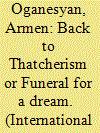

|
|
|
|
|
| Publication |
2013.
|
| Summary/Abstract |
PATROCLUS LAY DEAD while Achaeans and Trojans were still fighting over his body. Today, the controversy over Margaret Thatcher's heritage is going on unabated. The Conservative press has placed the former prime minister on a high pedestal under the slogan Back to Thatcherism. The Labor media, however, firmly relegated the Iron Lady into the past and turned this page of history declaring the former premier forever confined in the narrow British context.
|
|
|
|
|
|
|
|
|
|
|
|
|
|
|
|
| 3 |
ID:
101068
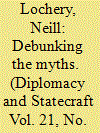

|
|
|
|
|
| Publication |
2010.
|
| Summary/Abstract |
In 1979, little was known about Margaret Thatcher's views on foreign affairs, except that she claimed to have little time for the Foreign Office, regarding it, along with the Treasury, as "bastions of compliancy." One point that did appear clear, at least superficially, during her time as leader of the opposition (1976-1979), and her three governments (1979-1990), was her apparent pro-Israel stance. This viewpoint appeared to be out of sync with the widely held British view, articulated by the Foreign Office, of a preference for the Arabs over the Israelis. This article disproves the idea of Thatcher's apparent pro-Israeli leanings. It uses documentary sources, many of which were gained through the Freedom of Information Act and have never been used before, to outline that during the Thatcher era there was a slide away from Israel and towards the Arabs in British Middle Eastern policy.
|
|
|
|
|
|
|
|
|
|
|
|
|
|
|
|
| 4 |
ID:
183158


|
|
|
|
|
| Summary/Abstract |
Although German Federal Chancellor Helmut Kohl and British Prime Minister Margaret Thatcher were on the same side in the Cold War, as well as in the same family of moderate centre-right parties, despite being roughly the same age and sharing a fundamental market-economic and Atlanticist orientation, they were not in harmony emotionally. This analysis demonstrates how different genders, incompatible conceptions of nation, history, and regional origins, as well as experiences of mutual frustration eclipsed their ideological commonalities and counteracted against the ‘emotional regimes’ of ‘the West’ in the Cold War. It breaks new ground in several respects. First, it does not examine strong feelings that blotted out all others but rather a range of more ambivalent and nuanced emotions. Second, it links the themes of gender and feeling by enquiring about the male or female manifestations and attributions of certain emotions. Third, it focuses on not only men and women at the top but considers their entourages as either amplifiers or ‘shock absorbers’ of the leaders’ feelings. Finally, it explores the scope and limits of the notion that the Cold War was an ‘emotional regime’.
|
|
|
|
|
|
|
|
|
|
|
|
|
|
|
|
| 5 |
ID:
123768


|
|
|
| 6 |
ID:
117352
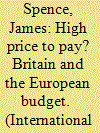

|
|
|
|
|
| Publication |
2012.
|
| Summary/Abstract |
One of the toughest issues at the time of UK accession to the EEC was the cost of being a member of the European club. The nature of the industrialized British economy ensured that the benefits of initial access were less pronounced than in other, longer-standing member states and quickly became a source of heated debate. Margaret Thatcher fought to get 'her money back' in the 1980s and the ensuing British rebate has become totemic for British politicians. As the European Union debates its next multi-annual budget, why has the budget proved so tricky for the UK? What are the drivers for the EU budget? And what is the rebate all about? This article argues that the UK has tugged in different directions over the EC-now EU-budget, which amounts to about 2 per cent of the Union's public expenditure. At times the UK has urged member states to improve financial management. At times it has pressed for greater redistribution between rich and poor regions through the budget. It has consistently criticized the large proportion of the budget going to support agriculture in the Union. It has, from the earliest days of its accession negotiations, argued about how much it contributes to the EU budget and how it should contribute less, whether it counted among the poorer or the richer member states. Britain has argued first for restraint, rather than promoting certain policy sectors in a consistent manner. While cohesion and competitiveness targets outlined in the 2000 Lisbon Strategy received strong support from the UK government and the Europe 2020 goals set concrete growth targets in line with the UK's own, this policy-shaping is tempered by constraint and restraint, and has not allowed the UK to draw full political benefit from the EU budget.
|
|
|
|
|
|
|
|
|
|
|
|
|
|
|
|
| 7 |
ID:
126724
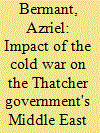

|
|
|
|
|
| Publication |
2013.
|
| Summary/Abstract |
This article argues that Margaret Thatcher's concern over Soviet ambitions was a highly significant factor behind the general agreement between 10 Downing Street and the Foreign Office (FCO) on the Middle East during the 1980s. Notwithstanding her instinctive understanding for the State of Israel, Thatcher increasingly perceived Israeli policies as a liability rather than an asset for Western interests, in view of worries that they were increasing instability in the region, and therefore undermining the security of Britain's Arab allies. Thatcher feared that the Soviets and other radical forces would exploit regional turmoil in order to expand their influence in the Middle East. Therefore, she agreed with the FCO on the urgent need to resolve the Israeli-Palestinian conflict as a means of defusing regional tensions at a time of heightened cold war friction.
|
|
|
|
|
|
|
|
|
|
|
|
|
|
|
|
| 8 |
ID:
108887
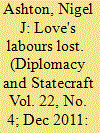

|
|
|
|
|
| Publication |
2011.
|
| Summary/Abstract |
Relations between Britain and Jordan underwent a revival during the premiership of Margaret Thatcher between 1979 and 1990. Although no longer the dominant power in the Middle East, Britain's membership of the European Economic Community and the close relations between Prime Minister Thatcher and President Reagan meant that Britain was seen by King Hussein as an influential power to be courted. Thatcher shared Hussein's views about the Arab-Israeli peace process and lent him strong support as the voice of Arab moderation. She also sought to use her personal relationship with Hussein as a vehicle to further British interests, particularly through her promotion of British arms sales, both directly to Jordan, and indirectly, through Jordan, to Iraq. This article makes use of a large body of British official documents secured under the Freedom of Information Act and Jordanian documents from the Royal Hashemite Archive in Amman to illuminate the development of bilateral relations over the course of the decade. It concludes by showing how the differing responses of Thatcher and Hussein to the Iraqi invasion of Kuwait in August 1990 ruptured their relations. Drawing on sources which have previously been unavailable the article offers a fresh perspective on important aspects of the international history of the Middle East during the 1980s.
|
|
|
|
|
|
|
|
|
|
|
|
|
|
|
|
| 9 |
ID:
137593
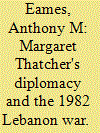

|
|
|
|
|
| Summary/Abstract |
The year 1982 emerged as pivotal in the Atlantic Alliance and the relationship between President Ronald Reagan and Prime Minister Margaret Thatcher. On 6 June 1982, Israeli Defense Forces breached the Lebanese border in a maneuvre to eradicate the Palestinian Liberation Organization. The campaign opened a violent episode in the decades-old Arab-Israeli conflict. Almost immediately the British Foreign and Commonwealth Office recognized the challenge to the international community. The crisis in the Middle East occurred during a period of substantial turnover in the foreign policy communities of both London and Washington. Subsequent improved bilateral relations between the United States and the United Kingdom paved the way for greater cooperation in international diplomacy between respective national executives.
|
|
|
|
|
|
|
|
|
|
|
|
|
|
|
|
| 10 |
ID:
059380
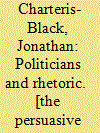

|
|
|
|
|
| Publication |
Hampshire, Palgrave Macmillan, 2005.
|
| Description |
xii, 239p.Hbk
|
| Standard Number |
1403946892
|
|
|
|
|
|
|
|
|
|
|
|
Copies: C:1/I:0,R:0,Q:0
Circulation
| Accession# | Call# | Current Location | Status | Policy | Location |
| 049238 | 825.910915/CHA 049238 | Main | On Shelf | General | |
|
|
|
|
| 11 |
ID:
176494
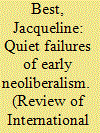

|
|
|
|
|
| Summary/Abstract |
While the last few decades of political economic history give the impression that the logic of neoliberalism is inexorable, this article argues that once we look further backwards and dig into recently declassified archives documenting the early days of neoliberal theory and practice, we find a messier picture. Economic policymakers in Thatcher and Reagan's administrations in the early 1980s did not set out to ‘fail forwards’ by generating a crisis that would enable a statist kind of neoliberalism. The key ideas that they drew on and the policies that they used to put them into practice sought to transform the economy indirectly, through a set of performative policy devices that they believed would generate a dramatic shift in people's inflationary expectations, lowering inflation without provoking a major recession. Archival records make it clear that these efforts were not only a failure, but also one that policymakers were acutely aware of at the time. By examining these quiet failures in economic policy, we can better understand how these governments simultaneously failed in their early efforts to introduce neoliberal economics and yet ultimately succeeded in transforming their economies in important respects – and in legitimising those transformations by narrating failure as a kind of inevitable success.
|
|
|
|
|
|
|
|
|
|
|
|
|
|
|
|
| 12 |
ID:
034847


|
|
|
|
|
| Publication |
London, WeidenFeld and Nicolson, 1988.
|
| Description |
vii, 248p.: ill.Hbk
|
| Contents |
Includes bibliography, index.
|
| Standard Number |
029779146X
|
|
|
|
|
|
|
|
|
|
|
|
Copies: C:1/I:0,R:0,Q:0
Circulation
| Accession# | Call# | Current Location | Status | Policy | Location |
| 029642 | 923.2/HAR 029642 | Main | On Shelf | General | |
|
|
|
|
| 13 |
ID:
177276
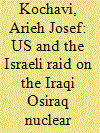

|
|
|
|
|
| Summary/Abstract |
On 7 June 1981, Israeli warplanes attacked Iraq's Osiraq nuclear reactor and destroyed it. Surprised by the raid, the Reagan's administration was puzzled about how to react. Some officials supported punishing Israel, while others recognized the advantages of the attack though they could not say it publicly. Washington knew that its moderate Arab allies expected a firm reaction, especially as Israel used American airplanes in the attack, apparently violating the 1952 Agreement between the two countries. Under the lead of President Ronald Reagan, Washington opted for a mild reaction, practically indirectly recognizing Israel's right to destroy the atomic reactors of its Arab enemies.
|
|
|
|
|
|
|
|
|
|
|
|
|
|
|
|
| 14 |
ID:
137377
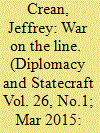

|
|
|
|
|
| Summary/Abstract |
President George H.W. Bush’s use of personal diplomacy has been a frequently noted but little studied subject in the scholarly literature. For the first time, this analysis examines the transcripts of telephone conversations between Bush and foreign leaders during Operation Desert Shield and Operation Desert Storm to determine the nature and purpose of these communications. Bush used these conversations more to build relationships than to persuade. He valued the contributions of the French president, François Mitterrand, over those of the British prime minister, Margaret Thatcher, and the assistance provided by the Turkish president, Turgut Özal, over that of the Egyptian president, Hosni Mubarak. The tensions of crisis and war did not bring Bush and Saudi Arabia’s King Fahd closer together, and a rupture occurred in his previously close relationship with Jordan’s King Hussein. In this process, public opinion in the United States and abroad remained of paramount concern.
|
|
|
|
|
|
|
|
|
|
|
|
|
|
|
|
| 15 |
ID:
144397


|
|
|
|
|
|
|
|